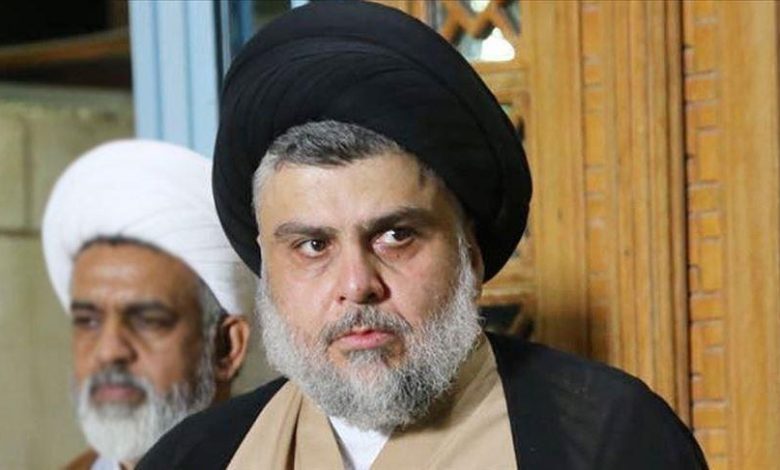Al-Sadr Seeks to Regain Religious Legitimacy Undermined by Al-Haeri’s Retirement

The Sadrist Movement, which has demonstrated its ability to mobilize the street and direct its supporters wherever it wishes in the ongoing political battle with its rivals from other Shiite forces that are affiliated with the so-called ‘coordination framework’, is seeking an alternative to its spiritual guide Kazem al-Haeri, whose retirement caused what might be called the “delegitimization” of the movement’s leader, Muqtada Al-Sadr.
Al-Haeri’s retirement appears to have weakened the Sadrist movement, although al-Sadr had indicated in previous tweets that this does not affect his movement’s position in the Iraqi component in general and the Shia in particular.
A report published by the British website Middle East Eye highlighted the trend among the Sadrist movement to look for an alternative to Al-Haeri, provided that he is an Iraqi authority not allied with Iran.
In a larger and broader context than the Sadrists’ movements, the conflict between the Qom reference and the Najaf reference has recently emerged from secrecy to public – something that seems highly complex given the overlapping and intertwining of the two references and the divisions within the Shia ranks between pro-Iranian and pro-Iraqi Shiites.
The British report considered that Iran had made a serious mistake by continuing to pressure the Sadrist movement in order to return it to the house of obedience and push it to join its coordinating framework, which includes the Shiite forces loyal to it.
Tehran sent many of its top officials after Iraq’s early legislative elections in October last year as part of efforts to reshuffle the Iraqi Shiite community and resolve differences between the Sadrist movement and pro-Iranian forces.
Among those who have visited Baghdad and Al-Hannanah, al-Sadr’s headquarters in Najaf, privately and publicly, are Qods Force commander General Ismail Qaani and former Revolutionary Guard intelligence chief Hussein Taeb, but their efforts have failed to contain Sadr.
The Middle East report suggested any rapprochement between the Sadrist movement and the activists of the ‘Tishreen revolution’, which Al-Sadr had invited to join the sit-in of his former supporters in the parliament and its surroundings. At the same time, he pointed out that Iran is seeking to tame the influential Shiite leader, and it has made great efforts in this direction to prevent the Sadrists from creating an imbalance in the political power between its allies, by delegitimizing Al-Sadr.
The British report referred to Al-Haeri’s retirement as an entry point to weakening the leader of the Sadrist movement, describing the Iranian steps as the most dangerous “through concerted efforts to tame the Sadrist movement within the Shiite fold by delegitimizing Al-Sadr.”
The report, translated by the Kurdish Shafaq News Agency, mentioned the timing of the announcement by Iran-based Ayatollah Kazem Al-Haeri, who was the spiritual guardian of the Sadrists following the will of Muqtada Al-Sadr’s father, who was assassinated in 1999.
He explained that Al-Sadr lost the religious mandate he had granted by Al-Hareri’s announcement of his retirement, which lifted the cover of eligibility for the Sadrist leadership. He added that “Shiite Islamic movements need a religious mandate, usually granted by the Grand Ayatollah, to engage in political affairs.”
He said that Al-Haeri’s resignation was a “decisive blow” to al-Sadr, but the latter showed stubbornness and steadfastness by going beyond what his opponents expected in challenging Iran by withdrawing his bloc from parliament and declaring his retirement from political work. This led to chaos and put Iraq on the verge of an armed clash between the Shiites, a step Tehran does not want.
The report pointed out that Al-Sadr, despite his announcement of the resignation of the policy, succeeded in making a comeback through the protests and sit-ins carried out by his supporters in the Green Zone. The report showed the extent of his influence and his ability to restore calm to Iraq by calling on his supporters to withdraw within an hour of the call.
“The wider battle is not over yet and the current situation represents a fragile truce, which was easy in part because of the approach of the annual Hajj pilgrimage to Karbala” to commemorate the Arbaeen, the source said.
The British report considered that “the most important task is to restore the religious legitimacy of the political movement and its leader.” It added, according to sources close to the Sadrist movement, that there are internal talks going on about choosing a religious authority for the movement, and that the focus is on selecting another Shiite “ayatollah” who is not loyal to Iran and who resides in Iraq, not Tehran, in order to obtain the required religious authorization to lead the Sadrist movement.












